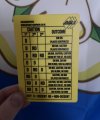I’m quite comfortable with using sinbins and with how they work. However even after a few years I do still have a few questions that I hoped someone might be able to weigh in on. They are all hypothetical and have never happened to me, but are possibilities:
1. What happens if one team has so many players in the sin bin that they fall bellow seven players on the field? I would assume it’s game abandoned as per LotG, but that feels a bit unnecessary if they’re going to be back over 7 players in a number of minutes.
2. What happens if a player commits dissent whilst in the sin bin? This is surprisingly something I’ve not had to deal with before, and would not be comfortable dealing with. At that point are they treated as a team official would be and just shown a regular caution? Or are they sin binned again and not allowed to rejoin, as per sin bin guidance for two dissent offences?
3. Apart from the obvious reasons, like the player being cautioned being a substitute, or the player is cautioned after the full time whistle, would there be any other reason for the referee to decide to issue a regular caution for dissent over a temporary dismissal. It is an option to report on wholegame, but is that option just for substitutes etc?
I find any information above the basics on sin bins annoyingly difficult to find. I do also have an issue with the way second temporary dismissals work and how a sin bin isn’t also counted as a first caution, but that’s a discussion for another time.
1. What happens if one team has so many players in the sin bin that they fall bellow seven players on the field? I would assume it’s game abandoned as per LotG, but that feels a bit unnecessary if they’re going to be back over 7 players in a number of minutes.
2. What happens if a player commits dissent whilst in the sin bin? This is surprisingly something I’ve not had to deal with before, and would not be comfortable dealing with. At that point are they treated as a team official would be and just shown a regular caution? Or are they sin binned again and not allowed to rejoin, as per sin bin guidance for two dissent offences?
3. Apart from the obvious reasons, like the player being cautioned being a substitute, or the player is cautioned after the full time whistle, would there be any other reason for the referee to decide to issue a regular caution for dissent over a temporary dismissal. It is an option to report on wholegame, but is that option just for substitutes etc?
I find any information above the basics on sin bins annoyingly difficult to find. I do also have an issue with the way second temporary dismissals work and how a sin bin isn’t also counted as a first caution, but that’s a discussion for another time.



